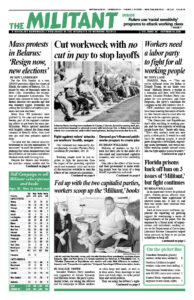October 30, 1995
DES MOINES, Iowa — The Iowa State Board of Parole for the first time in three years have agreed to meet with [Mark] Curtis.
Curtis, a member of the Socialist Workers Party, has been incarcerated since 1988, when he was framed on charges of rape and burglary while defending 17 co-workers at the Monfort (formerly Swift) meatpacking company. The “Swift 17” had been seized in an immigration raid on the plant. Curtis was beaten in the city jail by cops who called him a “Mexican lover, just like you love those coloreds.”
In September, a delegation of more than 20 trade unionists, political activists, local clergy, a farmer, former neighbors of Curtis, and other defense committee backers met with members of the parole board and delivered letters urging he be freed.
October 30, 1970
MONTREAL — Strong protest against the abrogation of all civil liberties throughout the province of Quebec was being heard here as Quebecois and Canadians reacted to the imposition of Canada’s sweeping war measures act. Federal troops have been patrolling the streets of Montreal for almost a week.
Resentments run strong against this manifestation of the contempt of Canada’s rulers for the basic rights of the Quebecois, who have been oppressed and discriminated against since Canada became a British colony several hundred years ago. But resistance to English Canadian oppression is also part of the historical record.
Questions remain unanswered. The answers depend on the strength of the mounting protest against this most serious threat to the civil liberties of Canadian citizens since the second world war.
October 27, 1945
The British dock strike continues solid. Estimates of the number of strikers range as high as 50,000. Striving desperately to crush this greatest dock strike since 1926, the government is bringing back troops from the continent to unload the 300 ships tied up in British ports. Some 10,000 soldiers are now being forced to act as strikebreakers.
The strike began a month ago in Liverpool when small groups of Longshoremen, fighting to maintain and improve wage standards, began walking out against the orders of the official union heads. The apparently “spontaneous” strike is led by a number of rank and file committees.
The workers resorted to the strike weapon to keep up their standard of living and to counter attempts of the bosses to place the burdens of the imperialist war on the backs of the working class.

